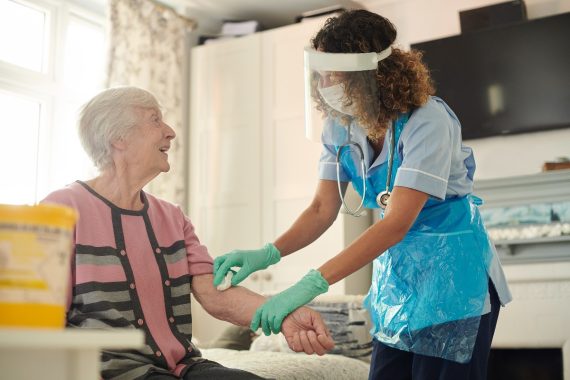People with dementia ‘face up to two-year wait for diagnosis’

People with dementia face waits of up to two years for a diagnosis because memory clinics are ‘chronically underfunded and overlooked’, an audit has found.
The national audit of memory assessment services in England and Wales, conducted between January and August 2021 by the Royal College of Psychiatrists and supported by Alzheimer’s Society, found the average wait from referral to dementia diagnosis has increased from 13 weeks in 2019 to 17.7 weeks.
It also found that waiting times across services nationwide now range from between 0 and 104 weeks (two years), compared to between 3 and 34 weeks in 2019.
Dementia diagnosis rates have dropped across all three nations due to the pandemic and are stagnating at around 62%, it found – below the national target of 66.7%.
In addition, it revealed a decrease in the prescription of early-stage dementia drugs. The audit said this suggests that more people are receiving their diagnosis later and therefore missing early access to drug treatments to help relieve symptoms.
It also found the vast majority of patients (92%) are referred by their GP, followed by referral from an acute hospital, community mental health team and day hospital.
In a series of five recommendations, the audit called for services to use ‘quality improvement methods’ to monitor waiting times from referral to diagnosis, and identify problem areas and barriers to access as services continue to recover from the impact of the Covid-19 pandemic.
It also suggested that:
- Commissioners/dementia regional boards should work with services to review the pathway to assessment, diagnosis and support, and the post-diagnostic pathway
- Services should ensure that assessment appointments include discussion of hearing, alcohol consumption, eyesight and falls, and follow-ups are carried out and documented
- Services should ensure that protocols for referral for neuroimaging are in line with the NICE guideline and recommended good practice assessed as appropriate per patient
- Commissioners/dementia regional boards should ensure that services can offer/have access to Cognitive Stimulation Therapy for patients diagnosed with mild-moderate dementia.
Alzheimer’s Society has been campaigning to return dementia diagnosis rates back to pre-pandemic levels.
James White, head of public affairs and campaigns at the charity, said increasing waits for diagnosis represent the ‘repercussions of dementia diagnosis services being chronically underfunded and overlooked, with regional inequalities only getting worse’.
He continued: ‘This audit paints a bleak picture for dementia diagnosis in large parts of the country. On average there has been a four-month increase in the wait for a diagnosis, which means in some areas there are now people waiting up to two years to be diagnosed with dementia.
‘Behind these statistics are potentially thousands of people missing out on months and months of vital support and treatments that could relieve their symptoms and enable them to stay independent for longer.’
Mr White said the extra investment ‘offers hope for the future’, but called for an extra £70m on top, to ‘clear backlogs, improve waiting times, and reduce local variations in diagnosis rates’.
This comes as the NHS backlog of people waiting more than two years for scans, checks, surgical procedures and other routine treatments shrunk to only 168 patients, although data last week revealed the numbers in England waiting for routine hospital treatments has risen to a record 6.7m.
Antipsychotic prescribing to dementia patients in care homes rose by over 50% on average during the pandemic, recent research also showed.
A version of this story was first published by Pulse’s sister title Nursing in Practice
Pulse July survey
Take our July 2025 survey to potentially win £1.000 worth of tokens

Visit Pulse Reference for details on 140 symptoms, including easily searchable symptoms and categories, offering you a free platform to check symptoms and receive potential diagnoses during consultations.










